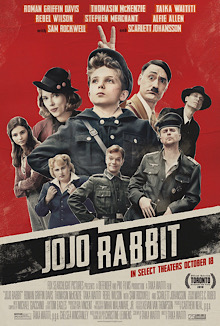
Taika Waititi is pretty hot stuff as a director these days and it’s amazing to watch his career grow from strength to strength from the earliest beginnings. This latest project takes on Nazis as an object of humor and it would so easy to misstep here and create all kinds of controversies. Indeed there are critics who assert that one should never make light of Nazis or the Holocaust, no matter how well intentioned. I would argue that enough time has passed that we can and should make jokes out of them if the intent is to mock those worthy of our contempt and derision and this film is a magnificently creative step in that direction.
During the later years of the Second World War, 10-year-old boy Jojo Betzler is an enthusiastic member of the Hitler Youth and even has a buffoonish version of Adolf Hitler himself as his imaginary friend. During a training camp, he is given the nickname Rabbit for not having the nerve to kill a rabbit when challenged to prove his bloodthirstiness. He tries to make up for it by seizing and throwing a grenade during a demonstration but only manages to injure himself. Excused from combat related duties, he spends more time at home and accidentally discovers a hidden compartment in the room of his deceased sister. It turns out that his mother, who opposes the Nazi regime, has been harboring a young Jewish girl Elsa. Jojo is unable to turn her in, knowing that this would cause trouble for his mother, and so interviews Elsa for information about Jews which he compiles into a book.
This is of course an over-the-top satire, made even more cartoonish with its use of vivid, Wes Anderson-like colors. It is not remotely realistic but then what would you expect out of a film in which Waititi, of mixed Polynesian and Jewish ancestry, cast himself as Hitler. The brazenness of making fun of Hitler in this way is admirable to me and the whole film is packed full of jokes that undermine every aspect of the Nazi ideology, down to the ridiculous sight of them Heil Hitlering each other when they meet. It also offers the insight of Elsa pointing out that for all that Jojo buys into the uniforms, salutes and slogans due to the indoctrination, he isn’t truly a Nazi as he is too young to understand what it really means and does not possess the requisite hate and cruelty. At the same time, though there is no graphic violence in this film, it makes it clear that terrible atrocities are happening in the background and neither Jojo’s age nor his relative innocence are sufficient to protect him from tragic loss. Maintaining the child-like point of view throughout and keeping the film funny without watering down the horror of the Nazis must have been an incredibly difficult balance to strike.
I’m inclined to be dismissive about most of the concerns raised by critics. For example some were upset by how it shows Klenzendorf, the captain who runs the youth camp, as being a committed Nazi who nonetheless has a good side. It seems obvious to me that people, even Nazis, aren’t just one thing or the other and having a Nazi character who is sympathetic to Jojo and Elsa isn’t at all the same as endorsing Nazism. I did however myself being uncomfortable with Jojo’s book which collects all the ridiculous superstitions and prejudices about Jews. Sure, it’s meant to be so blatantly outrageous and unbelievable that it’s funny but given the nature of the Internet, it’s a given that someone, somewhere will spread the illustrations of Jews with horns and the Devil inside their brains with malicious intent. That’s something that Waititi has no control over but I do wonder if it was a good idea to make and then show those illustrations in such detail.
All things considered, this is another winner of a film by Waititi and, as the director undoubtedly intended, with Trump as president of the US and white supremacy on the rise, the lessons it holds are even relevant to current affairs again.